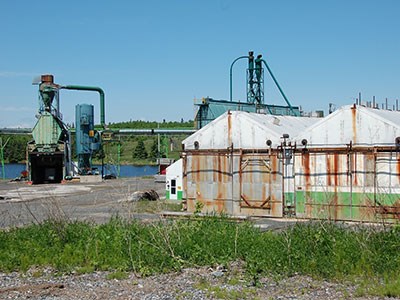The restart of a mothballed Kenora stud mill and a major expansion is hinging on the final approval of a Crown wood supply.
The Manitoba parent company of Kenora Forest Products, Prendiville Industries, is prepared to invest millions to modernize the shuttered operation and install an additional sawline, pending word of receiving a wood supply agreement from the Ministry of Natural Resources and Forestry.
Mill manager Rod McKay said negotiations are ongoing with the ministry and he was hopeful of good news sometime early this year.
The mill has been allotted a combined 339,000 cubic metres of Crown fibre from various management units in the area, including a small portion from the contentious Whiskey Jack Forest.
Should the company get the wood, Prendiville is proposing to also refurbish the planer mill and add another dry kiln. McKay declined to place a number on the company’s capital investment in the mill except to say it was “significant.”
McKay said it will be a huge expansion project involving construction of a massive new 340-foot-long planer mill with the latest technology, with plans to make machine stress-rated lumber.
The mill has been shuttered since April 2008 when the crash of the U.S. housing market caused Prendiville to close the operation and lay off 105 employees.
However, the company was able to retain, and even increase, its Crown fibre allocation through the provincial government’s wood supply competition with the promise that the mill would restart once economic conditions improved.
Tentatively, Prendiville is aiming for a September mill restart. But if the company doesn’t get the green light on fibre, construction won’t proceed.
David Hayhurst, director of the ministry’s operations branch, said they’re close to reaching a supply agreement after working with the company for more than a year on an “alternative process” to get them wood based on Aboriginal economic opportunities.
Legal challenges by the nearby Grassy Narrows First Nation that resulted in last summer’s Keewatin decision made offering Crown wood to the company through the province’s wood supply competition a very contentious issue.
“What we’ve been working on for the past year is going to replace anything that we’ve done prior,” said Hayhurst. “Basically, we’re going to wipe those (wood supply offers) out and start fresh.”
Hayhurst said Kenora Forest Products has reached out and made arrangements with some local Aboriginal businesses which will form the basis for a new allocation.
The company has an employment target for Aboriginal people to work in the mill, has a training program, and intends to buy wood from Aboriginal companies, if they can provide it.
Last August, when the Kenora Forest Products and Unifor reached a six-year contract to prepare for the 2015 restart, included in the deal was a 30 per cent employment target for Aboriginal participation in the mill’s workforce.
“We’ve pretty much completed our discussions around a proposed supply agreement,” said Hayhurst.
“Once we’ve settled on that – and we’re very close – the Crown has to complete its Aboriginal consultation requirements, which normally takes a couple months, then notify SFL (Sustainable Forest License) holders of the proposed amendments to support that draft supply agreement.”
Hayhurst said this new arrangement shouldn’t impact previous Crown wood offers made to forest product products elsewhere in Northern Ontario.
McKay said a small log line will be installed to make lumber from tree tops and produce chips as a by-product to sell to pulp and paper producers.
“Because we’re going into a smaller log diet (diameter), we’re going to process the whole tree. In the past, we let all the small tops – smaller than 5 to 5.5 inches – go to the pulp mills for pulp wood.”
The details of the expansion were made public during an open house in December.
“We wanted to show the public some of the designs and how it may or may not impact the community because of the size of the buildings.”
McKay is hoping to recruit a workforce of 100 with a mix of trainees and former employees, many of whom are working in Western Canada but still maintain homes in town.
“Even with the open house, and not advertising, we’ve had got lots of folks dropping off resumés.”
Winnipeg-based Prendiville has three other mills in Manitoba that make lattice products, decking, fencing, utility poles and other wood products for the North American home building and natural resources industry.
“We always planned on restarting,” said McKay. “We even announced it as a temporary shutdown.”
McKay said the time off gave company officials an opportunity to rethink the whole Kenora operation and redesign the business.
Kenora Forest Product’s traditional markets are the U.S. Midwest and customers as far south as Texas, along with some Canadian sales.
The company had previously announced tentative dates for a restart, but the market wasn’t ready for quite a few years. Now McKay said there are plenty of queries from customers looking to buy wood.
“We would like to be running now because the market is good.”




